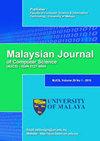对2018年马来西亚大选进行情绪和内容分析的社交媒体分析
IF 1.2
4区 计算机科学
Q4 COMPUTER SCIENCE, ARTIFICIAL INTELLIGENCE
引用次数: 2
摘要
本研究分析了2018年马来西亚大选(GE14)期间Twitter的政治用途,使用情绪和内容分析来检查马来西亚城市人的在线交流模式。具体而言,使用朴素贝叶斯、支持向量机和随机森林对英文推文进行情感分析,并将结果与两种矢量化方法进行比较。马来语的推文使用了涉及人类专家的内容分析。从2018年4月15日到2018年5月14日,使用热门话题标签获取推文,从而获得190 224条推文的精选语料库。Naïve与Word2Vec一起使用的Bayes在GE14前、GE14后和GE14后的准确率分别为63.7%、66.8%和64.9%,优于所有其他模型。总的来说,结果表明,英语母语者在第14届大选前、第14届大选当天和第14届大选后的大多数情绪都是积极的,其次是消极和中性的。虽然马来人也有类似的情绪,但他们在选举日的大多数情绪是负面的(即42%),而英语人士(即31%)则相反。本文章由计算机程序翻译,如有差异,请以英文原文为准。
SOCIAL MEDIA ANALYTICS USING SENTIMENT AND CONTENT ANALYSES ON THE 2018 MALAYSIA’S GENERAL ELECTION
This study analysed the political use of Twitter during the 2018 Malaysian General Election (GE14), using sentiment and content analyses to examine the patterns in online communication among urban Malaysians. Specifically, Naive Bayes, Support Vector Machine and Random Forest were used for sentiment analysis for the English tweets, with the results compared against two vectorization approaches. Content analysis involving human experts was used for the Malay tweets. Top trending hashtags were used to fetch tweets from April 15, 2018 to May 14, 2018, resulting in a curated corpus of 190 224 tweets. Naïve Bayes used along with Word2Vec outperformed all the other models with an accuracy of 63.7%, 66.8% and 64.9% for pre-GE14, GE14 and post-GE14, respectively. Generally, results indicate the majority of the sentiments to be positive in nature, followed by negative and neutral during pre-GE14, GE14 day and post-GE14 for the English speakers. Though similar sentiments were observed for the Malay speakers, the majority of their sentiments on election day were negative (i.e. 42%) as opposed to the English speakers (i.e. 31%).
求助全文
通过发布文献求助,成功后即可免费获取论文全文。
去求助
来源期刊

Malaysian Journal of Computer Science
COMPUTER SCIENCE, ARTIFICIAL INTELLIGENCE-COMPUTER SCIENCE, THEORY & METHODS
CiteScore
2.20
自引率
33.30%
发文量
35
审稿时长
7.5 months
期刊介绍:
The Malaysian Journal of Computer Science (ISSN 0127-9084) is published four times a year in January, April, July and October by the Faculty of Computer Science and Information Technology, University of Malaya, since 1985. Over the years, the journal has gained popularity and the number of paper submissions has increased steadily. The rigorous reviews from the referees have helped in ensuring that the high standard of the journal is maintained. The objectives are to promote exchange of information and knowledge in research work, new inventions/developments of Computer Science and on the use of Information Technology towards the structuring of an information-rich society and to assist the academic staff from local and foreign universities, business and industrial sectors, government departments and academic institutions on publishing research results and studies in Computer Science and Information Technology through a scholarly publication. The journal is being indexed and abstracted by Clarivate Analytics'' Web of Science and Elsevier''s Scopus
 求助内容:
求助内容: 应助结果提醒方式:
应助结果提醒方式:


